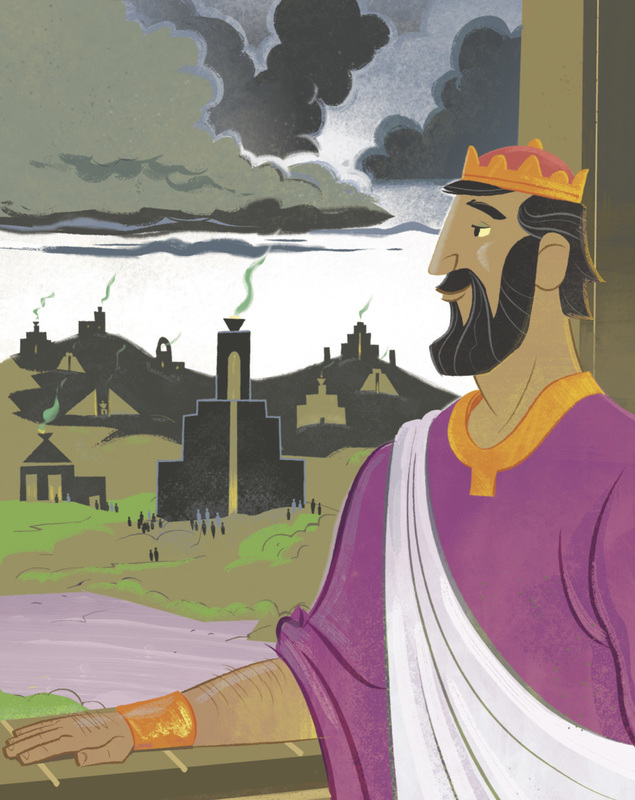Solomon's Sin Divided the KingdomDear Parents,
The Gospel Project for Kids continues to follow the life of Solomon today but gives another story of sin and its result. Solomon, with his God-granted wisdom, still made many mistakes. Solomon had married many foreign women and was led away from worship of the one true God to follow the gods of his foreign wives. God told Solomon that for the rest of his life he would be king of Israel, but once he died, Solomon’s son would have all but one tribe ripped out of his hands. Jeroboam, one of Solomon’s servants, turned against Solomon. Once Solomon died and his son, Rehoboam, took the throne, Jeroboam led most of the nation of Israel to follow him north, where he set up his kingdom in Samaria. Rehoboam didn’t like being king of only one tribe and decided to attack the northern kingdom. God stopped his plans and the nation was divided. Jeroboam formed two golden calves and told the people of the northern tribes that they could worship the golden calves instead of having to go to Jerusalem to worship God at the temple. From that point forward, the northern tribe of Israel started a steeply declining spiral into sin that they would never recover from. King Solomon’s sin led to the division of Israel. Every king failed to lead God’s people perfectly. God’s people needed a better king, a perfect king! Through David’s family, God would send His own Son, Jesus Christ, to be King over God’s people forever. Jesus would lead the people perfectly back to God. |
Solomon’s Sin Divided the Kingdom
1 Kings 11–12
King Solomon loved God, but Solomon did not love God with his whole heart. Some of the things he did were not what God wanted him
to do. For example, God warned His people, the Israelites, to not marry people from other nations. They worshiped false gods, and God knew they would lead the Israelites away from Him, the one true God.
Solomon had hundreds of wives. Many of them were from other nations. Solomon’s wives turned him away from God. Solomon was not faithful to God like his father David. He began to worship the false gods that his wives worshiped. Solomon even built shrines where his wives could worship the false gods.
This made God angry. God had spoken to Solomon and warned him about false gods, but Solomon did not listen. God said to Solomon, “Since you have done this, I will take the kingdom away from you. You will be king the rest of your life, but when your son becomes king, he will lose everything except for one tribe.”
Jeroboam (JER uh BOH uhm) was an official for Solomon, and God intended to make him king of most of Israel. God raised up enemies against Solomon. Solomon’s servant, Jeroboam, turned against him and became his enemy.
When Solomon died, his son Rehoboam (REE huh BOH uhm) became king. The people told Rehoboam, “Your father Solomon made us work too hard. We will gladly serve you if you make our work easier.”
Rehoboam thought about it and asked his friends for advice. Then
he replied, “My father Solomon didn’t make you work hard enough! I’ll make you work even harder!” This was not the response God’s people were hoping for. The people from the northern tribes of Jerusalem went home. They didn’t want to serve a king like Rehoboam, so they made Jeroboam king. Only one tribe remained under Rehoboam’s rule, and that was the southern tribe of Judah.
Rehoboam didn’t like being king of only one tribe. He planned to attack the Northern Kingdom of Israel, but God sent a prophet to stop him. The prophet had a message from God. “Don’t fight them; the people of Israel are part of your family. I am the Lord, and I am in control of what is happening.” So Rehoboam went home.
Jeroboam was now king of Israel. Typically, the people of Israel would travel to Jerusalem to worship God at the temple, but Jeroboam was worried if they kept going to Jerusalem, they would start thinking of Rehoboam as their leader again. So Jeroboam came up with a
plan. He made two golden calves and made an announcement to the northern tribes.
“It is very inconvenient for you to travel all the way to Jerusalem to worship at the temple,” he said. “Look! These golden calves are the gods who brought your ancestors out of Egypt. You can worship them.”
What Jeroboam did was a sin! Those calves did not lead God’s people out of Egypt; God led His people out of Egypt. Jeroboam also built forbidden shrines and celebrated made-up festivals so Israel would seem like a better place to live than Judah. Jeroboam led all the people in worship to the false gods.
Christ Connection: King Solomon’s sin led to the division of Israel. Every king failed to lead God’s people perfectly. God’s people needed a better king, a perfect king! Through David’s family, God would send His own Son, Jesus Christ, to be King over God’s people forever. Jesus would lead the people perfectly back to God.
1 Kings 11–12
King Solomon loved God, but Solomon did not love God with his whole heart. Some of the things he did were not what God wanted him
to do. For example, God warned His people, the Israelites, to not marry people from other nations. They worshiped false gods, and God knew they would lead the Israelites away from Him, the one true God.
Solomon had hundreds of wives. Many of them were from other nations. Solomon’s wives turned him away from God. Solomon was not faithful to God like his father David. He began to worship the false gods that his wives worshiped. Solomon even built shrines where his wives could worship the false gods.
This made God angry. God had spoken to Solomon and warned him about false gods, but Solomon did not listen. God said to Solomon, “Since you have done this, I will take the kingdom away from you. You will be king the rest of your life, but when your son becomes king, he will lose everything except for one tribe.”
Jeroboam (JER uh BOH uhm) was an official for Solomon, and God intended to make him king of most of Israel. God raised up enemies against Solomon. Solomon’s servant, Jeroboam, turned against him and became his enemy.
When Solomon died, his son Rehoboam (REE huh BOH uhm) became king. The people told Rehoboam, “Your father Solomon made us work too hard. We will gladly serve you if you make our work easier.”
Rehoboam thought about it and asked his friends for advice. Then
he replied, “My father Solomon didn’t make you work hard enough! I’ll make you work even harder!” This was not the response God’s people were hoping for. The people from the northern tribes of Jerusalem went home. They didn’t want to serve a king like Rehoboam, so they made Jeroboam king. Only one tribe remained under Rehoboam’s rule, and that was the southern tribe of Judah.
Rehoboam didn’t like being king of only one tribe. He planned to attack the Northern Kingdom of Israel, but God sent a prophet to stop him. The prophet had a message from God. “Don’t fight them; the people of Israel are part of your family. I am the Lord, and I am in control of what is happening.” So Rehoboam went home.
Jeroboam was now king of Israel. Typically, the people of Israel would travel to Jerusalem to worship God at the temple, but Jeroboam was worried if they kept going to Jerusalem, they would start thinking of Rehoboam as their leader again. So Jeroboam came up with a
plan. He made two golden calves and made an announcement to the northern tribes.
“It is very inconvenient for you to travel all the way to Jerusalem to worship at the temple,” he said. “Look! These golden calves are the gods who brought your ancestors out of Egypt. You can worship them.”
What Jeroboam did was a sin! Those calves did not lead God’s people out of Egypt; God led His people out of Egypt. Jeroboam also built forbidden shrines and celebrated made-up festivals so Israel would seem like a better place to live than Judah. Jeroboam led all the people in worship to the false gods.
Christ Connection: King Solomon’s sin led to the division of Israel. Every king failed to lead God’s people perfectly. God’s people needed a better king, a perfect king! Through David’s family, God would send His own Son, Jesus Christ, to be King over God’s people forever. Jesus would lead the people perfectly back to God.





